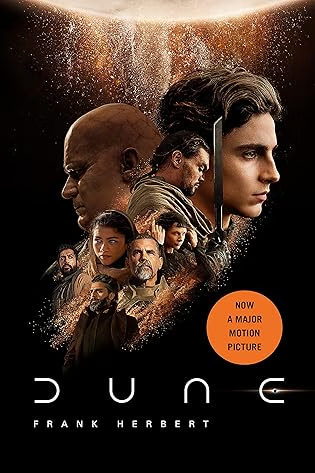Incredible world building, but I definitely felt the story lost me multiple times.
I've watched Dune 1 and 2 before having read this book, so I had a distinct advantage that Denis Villeneuve's version was already in my head and gave me an (effective) leg up on the visualisation of the world that Herbert was building.
Genunienly I found the world building and detail amazing, and even moreso the idea that this book was written in 1965 and that so many people had already fell in love with the book and world. That speaks, I think to the quality of the writing.
The story (again with the advantage of having watched the films) for the first half was engaging.
But then around the time in the book that wasn't translated to the screen, the scenes in which Jessica is becoming the Grand Mother, and Paul also drinks the Water of Life - he starts to trip out and I honestly lost the entire thread of the book at this point.
I was stuck in a period where I wasn't sure if I was reading a description of a dream or if the book had jumped forward in time. It was also around the middle of the story, so it felt important to know whether it was "reality" or not!
Eventually I just decided that I had misread somewhere along the lines and carried on with the book. I did feel like the 50-80% section of the story sagged quite heaverily and the story really slowed down. Possibly for even more world building, but by that point I was starting to find it hard to muster the motivation to read through a few more pages.
I did enjoy the final section of the book, and the story definitely accellorated, but, just like the movie Dune, Part Two, the book ends like a car running full pelt into a brick wall. The story is moseying along and then it just sort of ends in a way like someone smashed the book out of my hand and told me I can't read any more.
I've had lots of people tell me the sequels are great, and I don't doubt it, but I also like to read a book as a complete unit, and…well, the end, literally the last page definitely did not feel like the end of the book at all.
14 Highlights
the mystery of life isn't a problem to solve, but a reality to experience.
"The mind commands the body and it obeys. The mind orders itself and meets resistance."
For the others, we can say that Muad'Dib learned rapidly because his first training was in how to learn.
And she thought: Why do I let pride drive such words out of me?
The mind goes on working no matter how we try to hold it back, she thought.
Starlight displaced just enough of the night to charge each shadow with menace.
"Fear is the mind-killer. Fear is the little death that brings total obliteration. I will face my fear. I will permit it to pass over me and through me. And when it has gone past me I will turn to see fear's path. Where the fear has gone there will be nothing. Only I will remain."
I'll give you my father's answer to those who act without thinking: 'A stone is heavy and the sand is weighty; but a fool's wrath is heavier than them both.' "
We make no evening promises to be broken at dawn. When a man says a thing, that's the contract.
"span-nungsbogen"—which is the self-imposed delay between desire for a thing and the act of reaching out to grasp that thing.
The meeting between ignorance and knowledge, between brutality and culture—it begins in the dignity with which we treat our dead.
The concept of progress acts as a protective mechanism to shield us from the terrors of the future.
Deep in the human unconscious is a pervasive need for a logical universe that makes sense. But the real universe is always one step beyond logic.
"They have a narrow vision of time," Paul said. "They can see ahead to a blank wall marking the consequences of disobedience.
